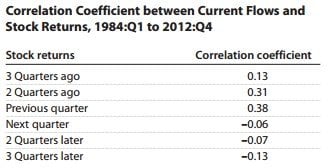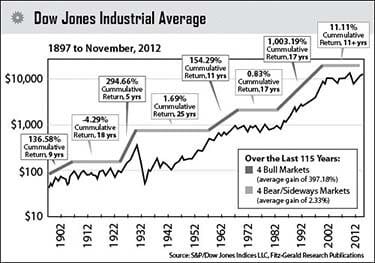Editor's Note: Keith originally shared this insight back in 2015, when rate hikes, disappointing earnings, and geopolitical uncertainty fueled market volatility. Though the reasons for today's renewed turbulence are different, Keith's reasoning for staying in the markets is as relevant as ever. Check it out...
My good friend Dennis, a Seattle-based TV studio producer, pulled me aside after I'd wrapped up an appearance on FOX Business Network to voice a sentiment I hear a lot these days:
...I'm almost 60 and scared to death by what's happening today - terrorists, a looming rate hike, slowing earnings, global growth cratering.
He rattled off half a dozen items bugging him, counting each on his fingers. Then he leaned in and quietly said...
...it makes me want to sell it all.
If you're like Dennis, you're not alone.
But here's the thing... no matter how grim the global situation is or even becomes, indiscriminately selling is exactly what you don't want to do.
It's one of the worst possible decisions any investor can make and, ultimately, one that will cost investors billions in lost profits.
Today we're going to talk about why and, because this is not a simple subject, I'm going to prove it to you, too.
Roller Coaster Stock Markets DON'T Have to Mean Roller Coaster Returns
We've talked many times about the importance of buying low and selling high. It's the path to higher returns.
So why is it that so many investors get it wrong?
The answer comes down to a phenomenon known as "recency bias." That's what they call it when investors make decisions based on what they see in the rearview mirror. If the markets are going up, they buy. If they're going down, they sell.
Simply put, they base their expectations for what's next on what just happened. That's like trying to bet which t-shirt a three-year-old will wear tomorrow, and about as successful.
Must See: This Great Depression-Era "Secret" Helped Transform Two Teachers into Millionaires. Read More...
In fact, there's very little correlation between past stock market returns and actual future returns.

Moreover, YiLi Chien, a senior economist for the St. Louis Fed, studied equity markets from 1984 to 2012 and found that the correlation between past market behavior is almost perfectly negative over time.
That jives with the DALBAR data we covered here in showing that individual investors who try to time the markets wind up damning themselves to terrible returns by falling far behind over time - nearly 200% behind, in fact.
People tell me frequently that they don't care. They want to sell anyway because they can afford to wait.
Respectfully, no they can't.
[mmpazkzone name="in-story" network="9794" site="307044" id="137008" type="4"]
Chien's study also shows that individual investors trying to second-guess the markets may fall behind by nearly 40% in only seven years. Extrapolate that out 20 years and you're talking about potentially missing out on 300% to 500% or more in cumulative gains.
Again, the flight to safety is a powerful incentive. I get it, but the stock market has a long-term upward bias that we've talked about many times. Sure, it may have some short-term speed bumps, but over time the constantly increasing amount of capital chasing fewer quality stocks ensures higher prices. Over a day, a week, a year... it really doesn't matter much.
Short-term instability inevitably gives way to higher prices over time.

Now, just for the sake of argument, let's assume you give in and you do sell. If you need the money, that's fine. There's nothing wrong with that.
However, what happens is most investors who bail inadvertently create a far worse problem - they find themselves needing to get back in.
Given that they timed things poorly on the way out, odds are good they'll time things poorly on the way in as well. So you get taken to the cleaners twice.
Ergo, pulling your money out of the markets may feel good, but chances are exceptionally high you'll miss out on the rebound and ALL the opportunity that comes with it.
You may agree with me totally. You may not. I have no way of knowing. What I do have, however, is a way of proving to you just how tough this actually can be courtesy of this handy market simulation from Quartz that uses a random 10-year history of the S&P 500 to drive the point home.
Try it a few times and let me know how you do in the comments section. My entire office did and not one person outperformed the markets despite some people trying three, four, even five times.
I think the game is one of the most powerful arguments for staying in the markets I've ever seen. It's certainly among the most persuasive.
Speaking of which, holiday-shortened weeks (like the President's Day just ahead) are almost always volatile. The volume thins down, spreads widen, and there's simply not as much going on. For the most part, that's normal.
What catches most people by surprise is what this means for prices.
Effectively, the combination of low volume and wide spreads means that any small price move is magnified. The headlines, of course, don't understand the subtlety, so any move risks being blown out of proportion. Up or down... it really doesn't matter.
The key to navigating this kind of trading is twofold: (1) you've got to take a deep breath and keep perspective, and (2) you've got to be prepared ahead of time.
We do both at Total Wealth.
We're confining our money to the six "Unstoppable Trends" we follow...
We're investing only in the best companies making must-have products tapped into those trends...
And we're controlling risk like a hawk by using dips as buying opportunities and selling into strength when there are big gains to be harvested and/or capital to be protected...
Last Year's 20 Triple-Digit Winners Are Just the Start
Keith Fitz-Gerald's Money Map Report subscribers who followed along with his recommendations took down 20 triple-digit winners last year - including a 201.68% return and 132.35% gain that closed out in the same week.
Two days into 2018, they closed another triple-digit winner worth 276.92%.
Each week, Keith shows everyday Americans how to tap into the world's biggest high-profit trends, ahead of the crowd.
There's nothing complicated or overly risky - and no guesswork involved.
Right now he's looking at another double-your-money opportunity, and there's still time to find out how to subscribe and access all of Keith's recommendations by clicking here now.
About the Author
Keith is a seasoned market analyst and professional trader with more than 37 years of global experience. He is one of very few experts to correctly see both the dot.bomb crisis and the ongoing financial crisis coming ahead of time - and one of even fewer to help millions of investors around the world successfully navigate them both. Forbes hailed him as a "Market Visionary." He is a regular on FOX Business News and Yahoo! Finance, and his observations have been featured in Bloomberg, The Wall Street Journal, WIRED, and MarketWatch. Keith previously led The Money Map Report, Money Map's flagship newsletter, as Chief Investment Strategist, from 20007 to 2020. Keith holds a BS in management and finance from Skidmore College and an MS in international finance (with a focus on Japanese business science) from Chaminade University. He regularly travels the world in search of investment opportunities others don't yet see or understand.



